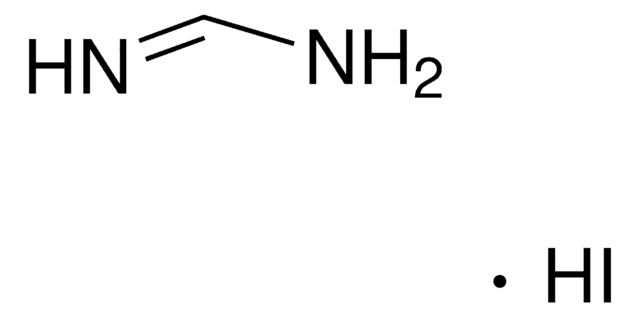793833
Methylammonium triiodoplumbate(II) precursor solution
40 wt. % in DMF
Synonym(s):
Methanamine, triiodoplumbate(1−), Methylamine triiodoplumbate(1−), Methylammonium triiodoplumbate(1−), Plumbate(1−), triiodo-, hydrogen, compound with methanamine (1:1)
About This Item
Recommended Products
form
solution
greener alternative product characteristics
Design for Energy Efficiency
Learn more about the Principles of Green Chemistry.
sustainability
Greener Alternative Product
concentration
40 wt. % in DMF
refractive index
n20/D 1.520
density
1.368 g/mL at 25 °C
λmax
321 nm
greener alternative category
, Enabling
Application
Signal Word
Danger
Hazard Statements
Precautionary Statements
Hazard Classifications
Acute Tox. 4 Inhalation - Acute Tox. 4 Oral - Aquatic Acute 1 - Aquatic Chronic 1 - Eye Irrit. 2 - Repr. 1A - STOT RE 2
Storage Class Code
6.1C - Combustible acute toxic Cat.3 / toxic compounds or compounds which causing chronic effects
WGK
WGK 3
Flash Point(F)
141.0 °F
Flash Point(C)
60.56 °C
Choose from one of the most recent versions:
Certificates of Analysis (COA)
Don't see the Right Version?
If you require a particular version, you can look up a specific certificate by the Lot or Batch number.
Already Own This Product?
Find documentation for the products that you have recently purchased in the Document Library.
Customers Also Viewed
Articles
Solar panel demand surges for sustainable energy, with power output rising from 5.0 to 90 GWh/d from 2010 to 2016.
Colloidal quantum dots (CQDs) are semiconducting crystals of only a few nanometers (ca. 2–12 nm) coated with ligand/surfactant molecules to help prevent agglomeration.
Controlled synthesis of metal clusters regulates ligands and atoms, advancing metal nanomaterial synthesis.
Next generation solar cells have the potential to achieve conversion efficiencies beyond the Shockley-Queisser (S-Q) limit while also significantly lowering production costs.
Our team of scientists has experience in all areas of research including Life Science, Material Science, Chemical Synthesis, Chromatography, Analytical and many others.
Contact Technical Service















